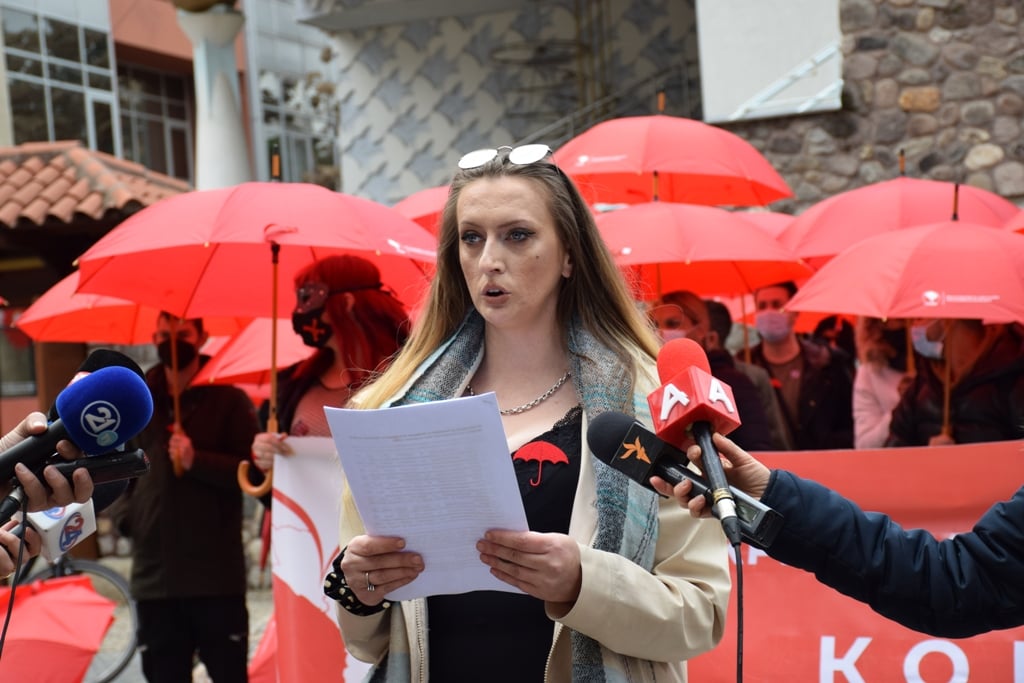Violence against sex workers remains acute in the CEECA region, and our members and peers campaigned tirelessly this year to make the voices of sex workers heard and bring attention to this issue. Although the COVID-related measures prevented meeting in person in many places, numerous demonstrations and discussions have been held. The regional context is characterized by a solid traditional conservative mainstream where sex Workers are seen as unacceptable and acting against morality. Several worrying trends has recently been reported by SWAN, including HIV detection, increased crime incidence and deportations.
Our members shared their activities on Dec 17, and here is more on that:
Macedonia. The STAR – The First Sex Workers Collective in the Balkans, HOPS – Options for Healthy Life Skopje, and Coalition MARGINI organized the Red Umbrella March in Skopje with the main message addressing the public institutions that sounded like a question ‘When there will be decriminalization?’. The group hopes that the institutions will respond to their demands as soon as possible, leading the decriminalization process together. With this year’s campaign, the group once again emphasized the need to decriminalize sex work as the best legal framework for the promotion of human, labor, and health rights of sex workers, as well as the urgency of adopting a new legal framework for regulating sex work in the Republic of Northern Macedonia. The STAR – First Collective of Sex Workers in the Balkans, launched a platform and submitted a proposed initiative to the authorities for amendments to the Criminal Code (Article 191) and the Law on Misdemeanors against Public Order and Peace (Article 19), which penalize certain activities related to sex work. The march participants demanded immediate decriminalization of sex work, meet the needs of us sex workers, and protect human and labor rights. Other requirements were related to safe working conditions, protection from violence and abuse, and access to justice and healthcare.
Greece. On Dec, 17, the Red Umbrella Athens marked its birthday. Six years ago, on this day Red Umbrella Athens first opened its doors to house exactly what this day highlights. The organization works to promote the response to violence against sex workers. The idea and implementation of Red Umbrella Athens came through Streetwork Project and Θετική Φωνή (Positive Voice) as through sharing condoms, solidarity and relationship with sex workers. These groups also wanted to address the need for a community space, where those individuals share their stories, concerns and needs in their own space rather than in their workplace, among clients. The group also shared some results, such as around 800 women and 700 men were reached, and 25 different incidents were documented. Red Umbrella Athens comments: ‘This number of crimes today is unfortunately much higher in Greece. Furthermore, there are incidents of violence by police and other state authorities.’
Slovakia. Odiseus published a statement to commemorate December, 17 pointing out this international day to remember that sex business is work and violence against people working in sex business cannot be tolerated. Odiseus remarks: ‘We commemorated this day with our clients in the field, to whom we distributed red umbrellas as a symbol of people working in sex business.’
Kyrgyzstan. Shakh Ayim shared an analysis of hate crimes against sex workers that appear in the OSCE/ODIHR Report. Shakh Ayim reported 33 hate crime cases documented in Kazakhstan, Kyrgyzstan, Russia and Tajikistan. Overall, the 2020 OSCE/ODIHR report encompasses 65 cases of hate crimes against sex workers submitted by civil society organizations and groups from ten countries. On December 17, Shakh Ayim calls for an end to violence against sex workers by abolishing punishment for sex work, stopping punitive law enforcement practices and properly investigating cases of violence against sex workers
Russia. On December 14, an exhibition of artist and former sex worker Marusya Morkovkina with support from the Forum of Sex Workers, Russia, was launched in Moscow. On the first day of the exhibition, HIV testing was provided free of charge. “The paintings that Marusya brought here speak of violence and cruelty, which, unfortunately, also happens to sex workers. This is probably the most vulnerable group to violence. For criminals, this is an ideal victim, ”said Marina Avramenko, public relations specialist for the Forum. According to Morkovkina, one of the main problems in the life of sex workers is stigmatization: “All my work is aimed at reducing stigma, so that they are treated as people. For example, a sex worker may face insults if he seeks help from a doctor in a regular clinic. Paid doctors are more loyal. Therefore, sex workers try to use paid healthcare, but not everyone is able to do it.”
An activists of the Forum of Sex Workers, together with her boyfriend, recorded a rap song that is directed against stigma and violence against sex workers. You can listen to the rap song here. As well, many sex worker peers and supporters across Russia have also made a collage of “Truth in the Mirror” – photos that tells stories of violence and how to confront it.
